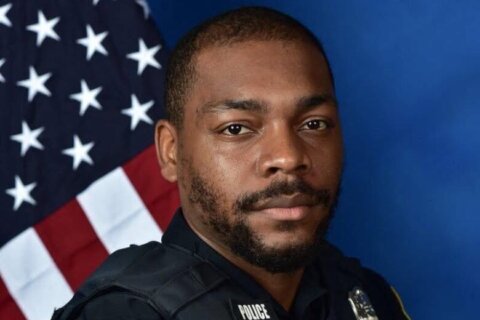D.C. voters will elect the city’s next mayor in November.
Three candidates are seeking to challenge Mayor Muriel Bowser, who is vying for a third term. If elected, Bowser would become the District’s first mayor since Marion Barry to serve three terms.
Bowser’s second term coincided with the coronavirus pandemic, the George Floyd protests and the Jan. 6 attack — all which profoundly affected the city’s residents, thrusting D.C. and its governance into the national spotlight. After weathering a primary challenge, Bowser seeks a renewed show of support from the city’s deep-blue voter base, but faces questions over her handling of a rising homicide rate, public housing and homelessness.
Joining Bowser on the ballot are Republican Stacia Hall, independent Rodney “Red” Grant and Libertarian Dennis Sobin. WTOP spoke with all four candidates about their plans to address crime, homelessness, housing and more.
Meet the candidates
Muriel Bowser, Democrat
After eight years on the job, Bowser is pitching voters a third term that’ll enable her to flesh out longer-term projects, such as bringing the Department of Human Services under a single leadership and completing a new hospital east of the river. She also seeks a renewed mandate from voters to advocate for local interests on Capitol Hill, faced with the potential of a split or Republican-led Congress after the midterms.
“It’s important to be counted, especially as we go into uncertain times nationally,” Bowser said. “I want to be able to say, when I go up to the Hill or when I go to speak with businesses, that D.C. residents are with me. Much has been said about third terms, and my experience is that longevity in this job is beneficial for a lot of reasons.”
Stacia Hall, Republican
Republican nominee Stacia Hall is faced with an uphill battle in a city that for decades has overwhelmingly favored Democrats in all levels of government. Hall, who advanced from her party’s primary with just over 2,300 votes, presents herself as a businesswoman and local faith leader with an outsider’s perspective on politics.
“This city needs a new leader. We’ve been dealt the blow of the same liberal party for a couple of decades now, so it will be great for change,” Hall said. “I came from welfare, and I went from poverty to prosperity. I believe everybody can have that same opportunity.”
Rodney ‘Red’ Grant, Independent
Entertainer and executive-turned-politician Rodney “Red” Grant says he’s a “humanitarian, philanthropist and entrepreneur,” whose experience working for Viacom and founding youth outreach programs helped him develop the management skills needed to run the nation’s capital.
Grant’s platform centers small business, youth programming and accountability — all which he says Bowser’s tenure has lacked.
“We’re gonna make sure we manage the city properly, and that right there is going to be the biggest difference,” Grant said. “There’s so much red tape in our city, and there’s no accountability. “I want to make sure that all residents are treated equally … let’s break down the barriers that have been separating us.”
Dennis Sobin, Libertarian
Decriminalization activist and author Dennis Sobin, whom Washington City Paper once declared “D.C.’s oldest living smut kingpin” for his past career running escort services and publishing pornographic magazines, has mounted a number of unsuccessful runs for public office over the years.
Sobin, who served more than a decade in prison as a convicted sex offender, admits he aligns with Bowser on most issues — but hopes his candidacy will encourage conversation on his biggest agenda: The full legalization of drugs and sex work.
“I think we’re alike on just about everything. [Bowser] is a good person; she’s experienced; she interacts well with people,” Sobin said. “But she doesn’t have the courage to stand up for getting the police out of the business of enforcing morality, rather than protecting people.”
Curbing violent crime
In the wake of a Northeast D.C. shooting in which a 15-year-old boy was gunned down on his porch, all four candidates agreed on an urgent need to confront violent crime by reinvesting in communities’ youth — but often differed in their stance on policing.
For Grant, combating crime means providing youth with enough programming to keep them out of harm’s way. He pointed to his founding of “Don’t Shoot Guns, Shoot Cameras,” a violence prevention program that teaches youth about the fundamentals of filmmaking, as one example of utilizing outreach programs to give young people early opportunities for success.
After-school programs and wraparound services for families experiencing trauma also factor into Grant’s plan, in addition to supporting law enforcement.
“We’ve got to invest in our young people, because if you look at it, kids under 18 are committing a lot of these crimes,” Grant said. “If we don’t get to our young people now, we’re gonna be in trouble as a city.”
For Bowser, dealing with crime is a matter of expanding the Metropolitan Police Department while continuing violence prevention efforts she started in her second term. Bowser stood by her plan to hire more officers despite criticism from community activists, and promised to focus on building block programs that would steer people away from violent crime.
“We have had the approach of investing across the spectrum and strategies to reduce crime, especially making sure we have a police department that is fully resourced and has all the officers that it needs, but also with violence prevention efforts,” Bowser told WTOP. “D.C. residents overwhelmingly said we need a mayor who will make the tough choices, even sometimes when it’s not popular, to make sure the city is protected.”
Bowser, along with Police Chief Robert Contee III, are currently engaged with the D.C. Council in an overhaul of the city’s aging criminal code. If elected to a third term, Bowser said, she would work with lawmakers to ensure any policy changes are public safety-driven and support residents who are victims of a crime.
Republican candidate Hall said she would work aggressively to raise police morale, blaming “the way they’ve been treated by the community” for MPD’s difficulty finding new recruits. Along with a higher police presence across the city, Hall’s public safety platform also calls for a new unit to address mental health crises, and a “youth delinquent prevention unit” that emphasizes recreation, parent-child interaction, anti-bullying programs and involvement of faith leaders.
For libertarian candidate Sobin, meanwhile, addressing gun violence in the city starts squarely in one place: Ending the drug war. Sobin says he would alter police tactics to win back community trust, including putting a stop to undercover operations.
“We are educating our citizens to disrespect the law, because people are either using drugs or doing something else that they feel is none of the government’s business,” Sobin said. “The cops are considered the enemy — not the people who are there to help us, but to regulate our behavior.”
Providing — and fixing — affordable housing
A scathing report detailing the D.C. Housing Authority’s failures in providing residents with safe and sanitary housing shocked city officials earlier this month, with Bowser admitting embarrassment over the agency’s dysfunction.
The 72-page federal report cited dangerous conditions at DCHA properties, including water damage, mold, acts of violence and the presence of lead paint. Bowser responded by ordering a top-down review of the agency.
“Nobody in the government and the city should be happy about what we saw in that report related to conditions,” Bowser told WTOP. “What we need to do as a government is figure out the best, fastest ways to support the housing authority … as a city, we have to decide what’s the best governance structure for the housing authority, and the best structure [for] what could be billions of dollars worth of local investment into bringing those units up to speed.”
Independent candidate Grant criticized the mayor for failing to reform the city’s troubled housing authority, given years of allegations of dysfunction, including for unethical and potentially criminal behavior. Grant’s platform seeks accountability for both the housing agency’s failures, and for negligent landlords.
“There’s no accountability for these slumlords who forget about residents living inside these spaces … they just care about the rent that’s coming in,” Grant said. “Nobody’s punishing them when they make these mistakes. We have to fix these places up and make sure we’re not just putting people in places that are rundown and unlivable.”
Sheltering the homeless
Asked about housing the city’s homeless population, Bowser, Hall, Sobin and Grant all acknowledged a need to solve poor conditions in shelters, but took different approaches to addressing tent encampments. Throughout her second term as mayor, mutual aid groups that assist the homeless have criticized Bowser for clearing several of the city’s homeless camps while failing to address their need for permanent housing.
Bowser said she’s “frustrated” by the persistence of tent camps in the District, despite two terms of transforming support services for the homeless and working to end family homelessness. The incumbent pointed to pandemic limitations on shelter occupancy as having the “unintended consequence” of driving people back into the streets.
Bowser expects the Coordinated Assistance and Resources for Encampments pilot program, a voucher system for temporary housing she spearheaded last year, will continue to feature in her strategy going forward.
“What we say is, people shouldn’t be living on the streets. Number one, it’s against our law, but it also isn’t good for them and it’s not good for the community they’re in,” Bowser said. “We’re working this pilot into our operations to get people out of tents and into permanent housing or appropriate shelter.”
Two mayoral candidates have had personal experience with homelessness — Republican candidate Hall and Libertarian candidate Sobin. On her campaign website, Hall says she spent a year in public housing and a few months in a homeless shelter; Sobin lived in a shelter for a time after his release from prison.
Hall sees Bowser’s mayorship as “uncaring and disconnected” from the realities of homelessness, calling conditions in shelters “deplorable.” As mayor, Hall said she would provide incentives for employers to seek new hires in the city’s homeless population, and would ensure rehousing and transition programs are staffed by “compassionate and caring” people with a desire to improve their community.
“The homeless have to be given attention from a person-by-person, case-by-case basis, it isn’t one-size-fits all,” Hall said. “We can’t just give them tents and then come and uproot them; we need to offer stability to these people.”
Sobin sees mental illness as a major part of the picture, and endorses bringing in medical and mental health professionals to assist with sheltering before resorting to forceful evictions. Owing to his Libertarian platform, Sobin stressed the need for any solution to “uphold liberty” and prioritize an individual’s choices over the state’s.
“They are good people, but many of them are either in temporarily bad situations, or are mentally ill, and we have to deal with them accordingly,” Sobin said, adding that he only sees shelters as part of the solution because “there are a lot of people” who for various reasons, including substance abuse and mental illness, “cannot live with other people.”
Independent Grant wants to bring in real estate developers with a proven ability and desire to develop affordable units, including providing a better system of checks and balances for those who don’t live up to their promises.
“We have to make it affordable for our residents to live here; we have to bring back the diverse middle class,” Grant said. “Our city is bred on a diverse middle class, and it’s being taken away. The mayor is waving at people leaving the city like she doesn’t even care.”
On DC statehood
Leveraging a Democratic majority, the House of Representatives took a historic vote in the midst of Bowser’s second term, declaring D.C. the nation’s 51st state. Although actual statehood is still a way off, with the country’s sharp division along partisan lines unlikely to change in the near future, Bowser — who testified three times on the matter before Congress — celebrates it as a win.
“Muriel has made the case that D.C. statehood is not only constitutional, but the only way to right the historic wrong of disenfranchising 700,000 Americans,” the mayor’s campaign website states. “Because of Muriel’s relentless pursuit of full democracy, more Americans nationwide understand that D.C. statehood is a voting rights issues, a civil rights issue and a racial justice issue.”
When asked about the District’s prospects of becoming the 51st state, Grant and Sobin also stood behind the idea — at least in principle. Grant, in particular, said he was excited about D.C. becoming a state but wants to ensure every corner of the city is given equal weight in the process.
“Some people don’t even understand what (D.C. gaining statehood) would look like,” Grant said, encouraging an “all-ward” conversation. “I’d like to make some type of decision where we can all come together and agree what our state would look like, and how it would benefit the people who live here.”
Sobin had a more pessimistic outlook. While the Libertarian candidate wants self-determination in the District, Sobin sees statehood as a fruitless effort perhaps better spent on addressing its taxation status without a voting representative in Congress.
“I think it’s pretty much a dead issue. We’d like to see it happen,” Sobin said. “But it’s not going to happen as long as the politics in the nation are the way it is.”
While she stopped short of opposing it outright, Republican nominee Hall expressed skepticism about statehood on constitutional grounds, echoing a frequent GOP claim that statehood for the District would only be possible through a constitutional amendment — a claim disputed by scholars and legal experts.
“D.C. is not set up to be a state; it wasn’t even originally supposed to be a place for people to live as we do today … it’s gonna be a real hard push,” Hall said. “If that’s something the majority of residents want, we’ll stand together and push for it, but you’d have to restructure the Constitution.”








